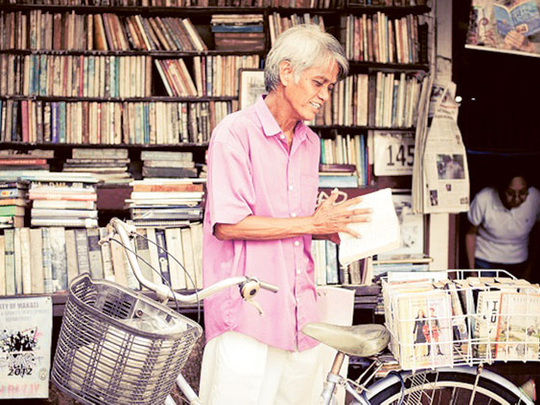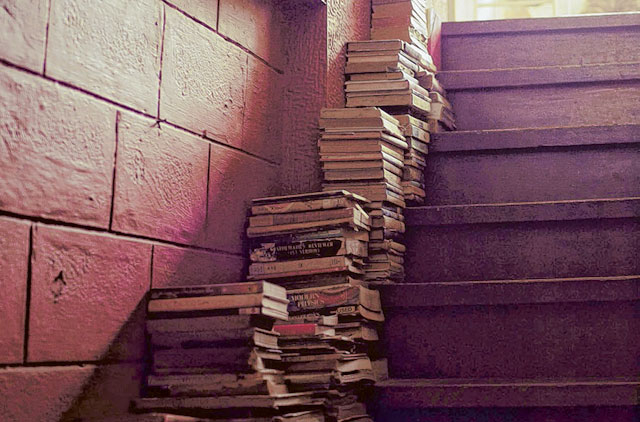
A life with a purpose is a life well lived, although it isn’t always clear where one’s true calling lies. Sure, there must be a lucky few who become aware of their life’s mission the moment they are born but most of us spend years, taking several detours, before we finally figure out what it is in the world — other than making money — that gives our lives a deeper meaning.
Manila “street librarian” Hernando Guanlao, 60, is one of the latter, and surely he is not wasting any second making up for lost time. Called Nanie by family and friends, the father of three turned his ancestral home into what people have come to know as “the library in Balagtas Street”, where everyone is free to come and go as they please, read books to their heart’s content, and even take home as many books as they can carry without having to worry about overdue fees. He now considers it his life’s mission to bring book readers together for a common cause, and to relay the message of the books to other people.
The library is open 24/7 to everyone — from office workers wanting to pick up a dog-eared novel during breaks or students in need of research material for a school project.
Surprisingly, it is this free-for-all rule that has kept the library alive and this former government employee, accountant and salesman busy for the past 12 years. “The books say you’re welcome. You are free to get them. You are free to borrow them. You are free to read them and bring them home. You are free to return them. So in the process, the library multiplies by itself,” Nanie says.
Nanie’s story has so inspired other people that many have already taken up the initiative to set up their own reading centres in Manila as well as in distant provinces in a country where more than a quarter of the population lives below the poverty line. These days, he devotes his time picking up donations by the truckloads and distributing them to other reading centres and public school libraries.
Reading Club 2000
Reading Club 2000 was established in the year 2000 (hence the name), not long after Nanie’s parents passed away. According to Nanie, his parents — both civil servants — were the ones who imparted to him and his siblings the value of reading. He woke up one day and decided to open a library in his home to honour their memory.
The library is located in a quiet residential area not too far from the opulent offices, commercial establishments and bustling corporate life of the Makati business district. Once you reach Balagtas Street, the library is hard to miss. On the kerb in front of Nanie’s house, textbooks and magazines are laid out on tables and mounted on shelves.
When you step inside the garage, there are more rickety shelves with everything from paperback novels and classics to college textbooks and heavy editions of reference books taking up every available space. A flight of stairs going to the upper storey of the house also serves as a makeshift bookshelf.
Nanie started out with only around a hundred books owned by him and his siblings, but as book donations keep coming in, there are now an estimated 2,500 books and magazines in the library. He says he does not keep inventories of the books and instead focuses his energies on encouraging other people who would like to follow in his footsteps.
“People have expressed interest in putting up a street library like this in other places. I’ve received letters telling me that my effort — this message of sharing and giving — has inspired them. So I encourage them to set up these libraries. I support them. And for their display, I encourage them to get books from me to start with. We are already supporting several street libraries and also existing libraries in schools,” Nanie says.
People from all walks of life visit the Reading Club in hope of finding an interesting book to take home, while donating books of their own to add to the collection. So many people from all over the Philippines have expressed interest in supporting Nanie’s cause that he has announced, through the Reading Club’s Facebook page, pick-up points where donors can head to.
We also took books along when we went to see Nanie. The night before I was supposed to meet him, I set aside some old paperbacks, a bundle of my daughter’s old textbooks, and some old editions of “Reader’s Digest”. I returned with books by James Clavell and Nathaniel Hawthorne. I would have taken more but I decided that two were enough for the moment. If I had taken more, they would just be waiting on top of my bookshelf at home instead of being enjoyed by future visitors.
As Nanie puts it, books need to be read and their message needs to be heard.
“A lot of effort has gone into the production of a single book. You need to cut a tree to produce the paper, and you need to have it printed. After reading, it would be a waste if you just put it inside the cabinet, inside your drawer, and not share the message of the book,” he says.
And this message is not lost on the local and international media, which have picked up the story of Nanie and his public library. The Reading Club has been featured in the BBC, The Guardian, New York Daily News, and the top media networks in the Philippines. I asked Nanie if this newfound popularity has affected him and his family in any way. His answer: it is the books that are taking the centre stage and he is just “spreading their message”.
“I just do PR work for the books — for these old, second-hand books. There is a very strong message coming from the books. And also, it gives me a sense of fulfilment, being a senior citizen. Mostly seniors are no longer productive when they reach a certain age,” he says. He adds that his wife is very supportive and his children are busy with their efforts to promote reading in Muntinlupa City, where they live.
Reviving the joy of reading
A visit to the city library with family or friends used to be a worthwhile weekend trip. Nowadays, it is just a thought, which makes some nostalgic and others find it hard to relate to. Ask any student today how they do their research and the answer you are likely to get is the internet.
With all kinds of information at our fingertips these days, libraries may no longer be on top of anyone’s list of places to visit. Important publications including Encyclopaedia Britannica and Newsweek magazine have been forced to halt the printing presses and concentrate on all-digital formats instead.
The Philippine government, too, is trying to catch up with the times by launching e-libraries, and most universities have made efforts to make library catalogues available on the internet. However, the convenience of going online, where information is updated in real time, is rendering some old, smaller libraries obsolete.
This information revolution is no fault of the present generation — they happened to be born into it — and the internet does bring with it a lot of good. One cannot, however, ignore two thirds of the Philippine’s population that still does not have access to the internet.
It is for this reason that Nanie is determined to introduce the less privileged children to the joys of reading — not a computer or tablet but real books. “Reading opens your mind to a lot of things. Reading is education. Reading is literacy,” he says.
The country’s problems in literacy and education may be too big for one man to solve but for Nanie, it is about making a small contribution in every which way a person can.
“I don’t want to complicate things and make it very difficult. If it is complicated, you need a complicated solution. So make it simple. As a matter of fact there are also other tools — other than the books — that can be used. Through the simple act of charity — by giving right back — you can help erase suffering.”
So what does Nanie get out of his charity work?
“I get to connect with lots of people. And I reach the barrios … remote villages in our country. Simple things like these. And normally those blessings are very rare.”
Naomi Ruth Ganhinhin is a writer based in Manila.













